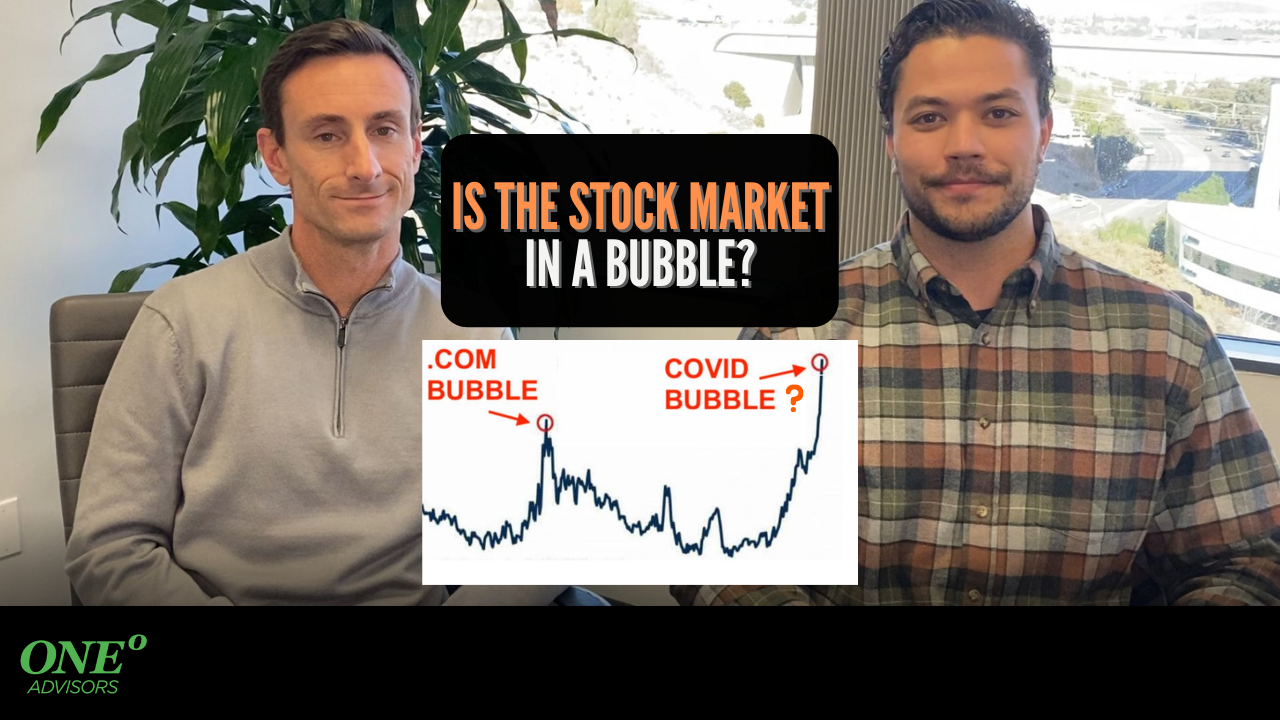Are we in a stock market bubble?
We are seeing some euphoric behavior and investors are trying to find this balance of growth without getting caught in a downward spiral. Stay tuned for what we think.
Watch here:
Audio version here:
Full transcript:
Alex Okugawa: All right, Anthony. So of course, it’s the dream of every investor. Right? We wanted to take participation in the upswing of the market. But we don’t want any of the downside risks. And of course, we know that’s not possible. But it does have some people wondering again, seeing euphoria in the market is, you know, are we in a bubble? Is it going to burst? What could that look like?
Anthony Saffer: Yeah, I mean, the question is, is valid, because there is that type of euphoric behavior that is, you know, indicative of bubbles. You know, for example, like Elon Musk tweeted out, use this messaging app called signal and all of a sudden, this stock that was unrelated, with the signal in the name gets bid up, people not doing research, the stock price takes off and then subsequently comes down.
Alex Okugawa: Yeah. Now, when investors are racing into like stock without doing any research, that can kind of cause for our pause for concern, and it can be a problem.
Anthony Saffer: Yeah, absolutely. I mean, the technology is at people’s hands. So they have their phones out. It becomes almost a form of gambling. And, you know, in a way, it is reminiscent of the late 90s. And that’s when I started my career when technology stocks really got bid up. The industry as a whole is is different at this time, because it’s a more mature industry with technology, you have a lot of these companies that are much more mature and ingrained in the overall economy, but you still have that type of behavior that’s out there.
Alex Okugawa: Well, and I always pause whenever someone says, you know, well, this time is different. Well, of course it is, every time is going to be different. Nothing looks exactly the same. I mean, things are different. Now, right back in the 90s, trades weren’t free today, most, you know, most trades if not all stock trades are free, depending upon the platform you use. And like you mentioned, you know, they’re trading platforms like Robinhood, where you just download an app on your phone, and people are checking it all throughout the day like they would Facebook or Twitter. So it’s incredibly addictive, you get those dopamine rushes really encourage that gambling behavior. So in some ways, things are different. In some ways. They’re the same, but it takes just a really disciplined approach. So as we look forward, right, 2000 was many years ago, some people have forgotten what that’s like, or they didn’t live through it. But 2000 was painful. When that bubble burst.
Anthony Saffer: It was and you know, because people that really got caught up in that euphoria, if they were overly concentrated got hit pretty hard. Now, it did affect the overall market. And so you know, a more diversified investor probably saw their portfolio goes down in some respects, but be more diversified really was the answer. I mean, shortly thereafter, people would brag about being dividend type investors, blue chip companies, because that was almost like a badge of honor, like “Hey I didn’t get caught in the technology bubble bursting. But it but that’s really where the solution comes in to be more diversified.
Alex Okugawa: Yeah. And I know, there are some proponents that will say, you know, the, the general market, the broad market as a whole, like the s&p 500 isn’t necessarily in a bubble. In fact, it’s, it’s doing quite wel. What we’re really experiencing is, is pockets of bubbles. And I know like Ben Carlson, in his, in his podcast has mentioned that so what is your take on pockets of bubbles? Is that actually something we’re experiencing?
Anthony Saffer: Yeah, it seems like it because there are really high valuations in certain areas and, and others, which seem much, much more reasonable. We also have to remember with these big indexes that, just take technology as an example. And this happened in 2000, is the s&p, you know, so much of it was allocated towards technology. And that really took off it became a greater and greater percentage. And now you’re seeing something similar. So being diversified is not just, staying necessarily in one index, but just really trying to cover the overall market, having some method to your overall plan.
Alex Okugawa: We talk about it all the time, right. Diversification is a key principle of investing success, but it’s also more important than ever, for, you know, people that are retirees or the pre retiree age, heading into retirement. You really need to make sure that everything is aligned. You have all of your ducks in a row here as you approach retirement or as I said, you’re in retirement. And these are the things that we help folks with making sure that everything’s aligned. Their investment plan is aligned with their financial plan. If this is something you’d like help with, give us a call, visit our website. We’d love to talk with you.
Talk with us about your portfolio or financial plan here: Talk with an advisor
More Reading: International Stock Markets: Should I invest internationally?
This does not constitute an investment recommendation. Investing involves risk. Past performance is no guarantee of future results. Consult your financial advisor for what is appropriate for you. See our website at onedegreeadvisors.com for full disclosures.

